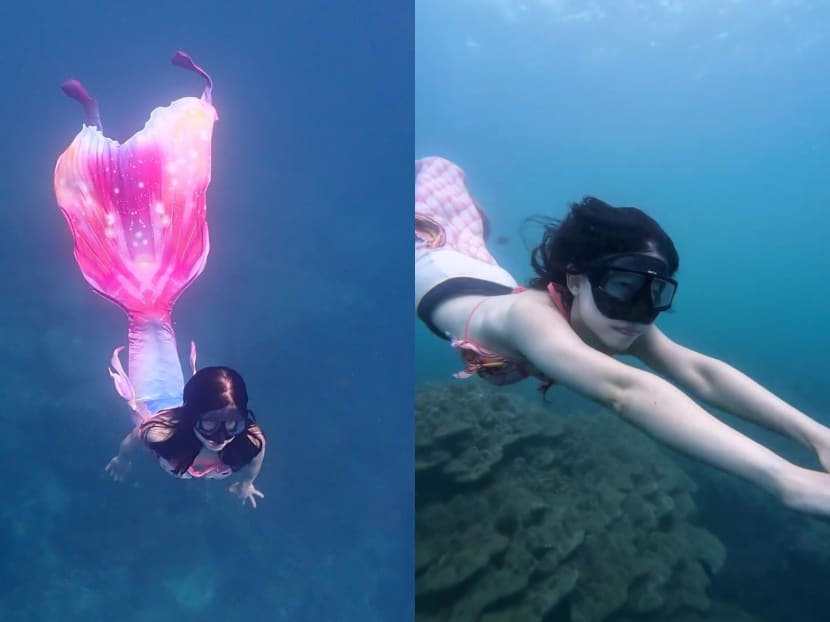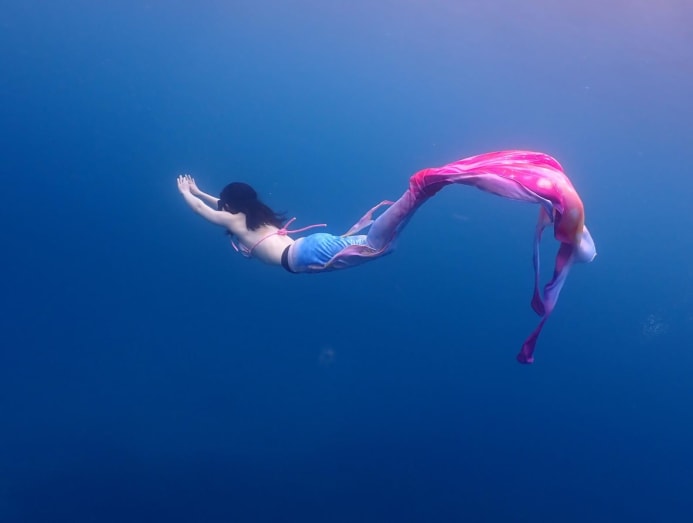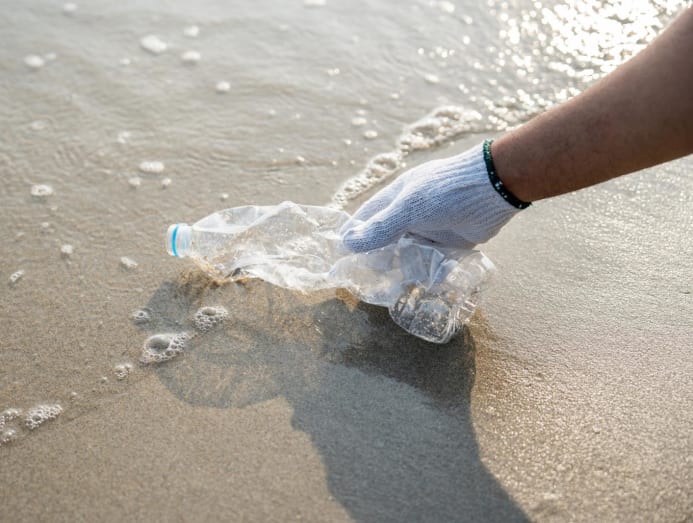I became a mermaid for fun, but it's given me a serious passion for saving the earth
Dr Alvona Loh Zi Hui finally pursued an old childhood dream to become a mermaid. Instead of soaking inĚýthe beauty of nature, she witnessed plenty of its destruction.

Dr Alvona Loh Zi Hui doing a mermaid freedive. (Photos: Alvona Loh Zi Hui)

This audio is generated by an AI tool.
When I was a young girl, I was obsessed with mermaids – beautiful mythical creatures in books and movies, and gorgeous women in aquariums who waved at children and blew kisses.
I so badly wanted to be a mermaid, too. I wanted to swim leisurely in the ocean with my glowing, flowing tail trailing behind me in the blue waters.Ěý
This year, at the age of 31, I finally decided to do something about it. After all, who says childhood dreams are only for children?
Mermaiding is essentiallyĚýfreediving while wearing gear in the form of a mermaid tail, a type of monofin. It is an activity that requires training and serves as recreation, therapy or an outlet for marine conservation, among other things.
I signed up for and completed a hyperbaric and underwater medicine course in Singapore this past October, to learn about handling oxygen pressure and more.
Real mermaiding requires a lot of freediving skills, and I was determined to train and condition my body to breath-hold and withstand pressure changes underwater.
The next month, I finally ticked this lifelong goal off my bucket list in Phuket, a destination in Thailand renowned for its crystal-clear waters and sea sports.Ěý
Over the course of a week, I learnt and performed many mermaid tricks, from underwater backflips to front flips to wall spins. I also learnt to hold my breath underwater for more than two minutes.
I returned to Singapore with a freediving certificate, mermaid videos and one more interesting hobby under my belt.
But I also came back with something I’d neither looked for nor expected: A newfound urgency to act on climate change and environmental destruction.
WHEN CHILDHOOD FANTASY BECOMES REAL-LIFE HORROR
During my first mermaid freedive, adrenaline surged through my veins. I hoped to see magnificent shoals of fishes, vibrant corals – maybe a shark or two, if I were lucky. I’d be a real-life Ariel, gliding through a vibrant, oceanic paradise.
Yet, instead of observing the beauty of nature, I witnessed plenty of its destruction.
A few minutes into the dive, I spotted long stretches of brown rock-like material with specks of white lying motionless on the ocean floor. I thought these were large rocks on the seabed.
A diver immediately corrected my mistake. These “rocks” were dying corals.Ěý
The world saw its worst global coral bleaching ever on record this year, news agency Reuters reported in October, with 77 per cent of the planet’s coral reef areas affected.
Coral bleaching occurs when corals expel colourful algae living in their tissues in response to heat stress and global warming, and become vulnerable to starvation and disease.Ěý
Observing these brown-and-white dying corals in stark contrast to my bright, man-made mermaid tail, I found myself gripped with gloom and guilt.
I wondered: Do we humans even deserve to enjoy the oceans in this way, after all we’ve done to destroy them?

DIVING INTO ENVIRONMENTAL ISSUES
As a newly minted mermaid freediver, my next goal was to dive in different parts of the world.
One popular dive site is the Maldives, which has gained a reputation as a diver’s paradise for its crystal clear waters, well-populated by a variety of turtles, manta rays, whales and sharks.
Fellow freedivers have encouraged me to visit the Maldives soon and often, because scientists have projected that 80 per cent of it could be uninhabitable by 2050 due to rising sea levels and climate change.
I felt a mounting sense of urgency in me to plan my trip as soon as possible. I didn’t want to miss out on the Maldives’ exquisite waters and its inhabitants.
Yet, a part of me wondered if this impulse was missing the big picture. Instead of just visiting the Maldives for myself before it’s gone, what if I looked for ways to help delay its impending demise?
What if I could keep visiting and diving in the Maldives, even beyond 2050? What if the generations that come after me could appreciate it, too?Ěý
NO MORE GOING WITH THE FLOWĚý
I’ll be honest: I’ve always understood the importance of combating environmental devastation, but I’ve never been one to raise my hand for activities that require me to go out of my way to contribute, like beach clean-ups.Ěý
This may sound bad to some people, but it’s not that I thought such things weren’t important. I just had no immediate vested interest to participate in them myself.
Now, facing the stark realities that threaten to destroy not only my childhood dream, but the dreams of so many others, I feel that I am racing against time to do something for the environment.Ěý
I’ve already started taking concrete steps to do this.Ěý
This month, instead of chucking into the bin an old camera that I hardly used, I decided to list it for sale online instead. I managed to sell it off the very next day.Ěý
It was just one item, but an inexplicable joy filled my heart that I could give my camera a second life and reduce electronic wastage. I plan to conduct more similar exchanges for items I no longer need or use, rather than just throwing them away.Ěý
I’ve even started looking for beach and ocean clean-up initiatives I can lend a hand to, especially through freediving.

Of course, real change doesn’t happen by one or two people doing one or two things.Ěý
We all have to start thinking beyond ourselves and what is convenient for our daily lives. Have we been “lazy” about reusing and recycling in our own homes, or about switching to energy-efficient options for our lighting and air-conditioning?Ěý
What about things that aren’t as convenient, that require us to go out of our way to do something positive? What’s your “beach clean-up” – a thing you’ve always known you should do for the environment, but have always found an excuse to put off?
Mermaiding has taught me that real life isn’t a fantasy. We can’t just focus on the beautiful or nice things and ignore the bad or ugly, hoping that we never have to deal with them.Ěý
It's no longer enough for us to just go with the flow. The time is now for us to take action and change the tide.Ěý
Ěý
Alvona Loh Zi Hui is a medical doctor working in Singapore.Ěý
If you have an experience to share or know someone who wishes to contribute to this series, write toĚývoices [at] mediacorp.com.sgĚýwith your full name, address and phone number.









